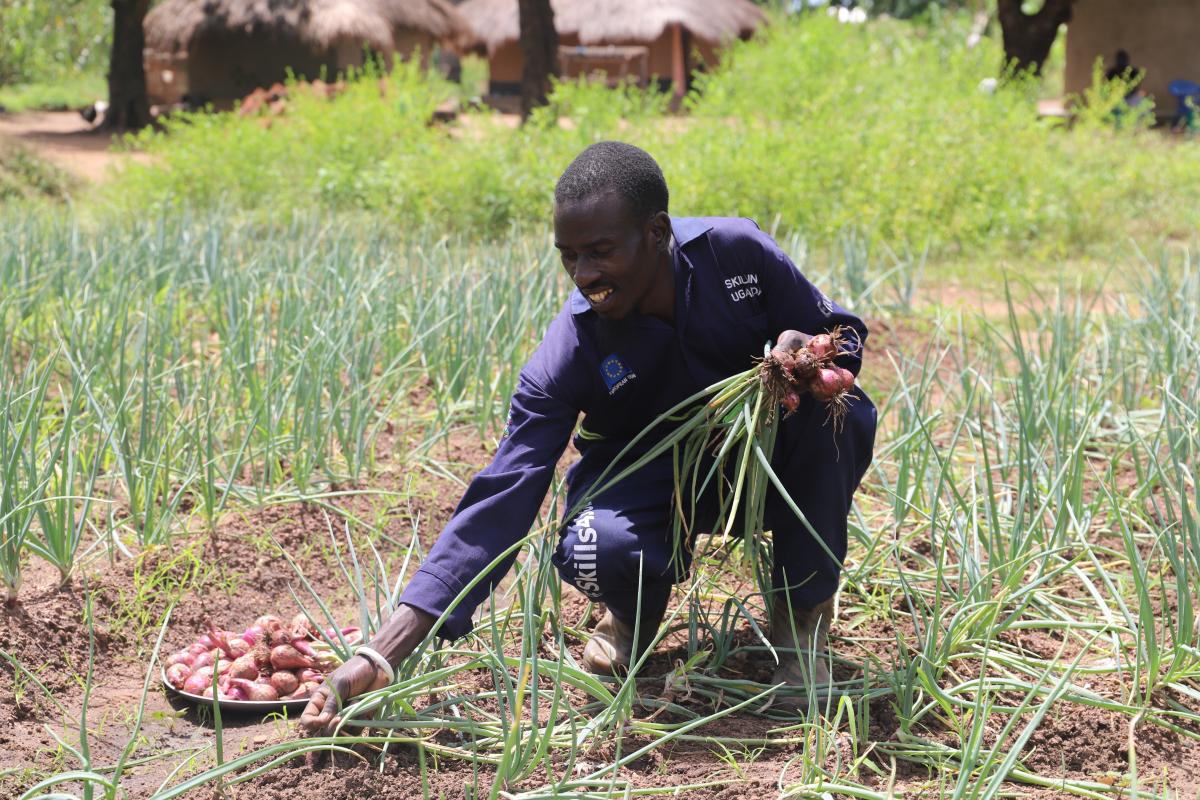Ratib is reaping big from vegetable growing in Uganda
After what he describes as hustling for 2 years on the streets of Arua and Juba in South Sudan, Ratib Ajidra, 33 decided to return home and rethink his life. He had dropped out of school in Senior Four, following the death of his older brother who had been supporting his education. Ratib decided to try his luck at agriculture, which he started on a small scale. He mainly grew cassava, groundnuts, simsim and maize. Most of it was for personal use and he would sell the excess. Later, he was invited by his peers and neighbors who were also engaged in farming to form a group and farm together to increase their produce and sell in bulk. Despite being in a group, there was lack of direction among the members, and they also lacked adequate knowledge of how to work together to realize profits in farming.
Their breakthrough came in 2019 when their group was approached by 3 NGOs namely War Child, ZOA and Cordaid International. The group of 25 youth farmers received training in agribusiness, how to properly clear their land for farming as opposed to burning bushes, how to work together as a group and how to write proposals to attract funding for their projects. With guidance from Cordaid international, the youths were formally organized into Kulala Cooperative, in which Ratib serves as the Secretary.
In February 2023, Enabel conducted a 2-week entrepreneurship training with the members of Kulala cooperative. They were trained to think like entrepreneurs, how to identify opportunities, how to identify the market, how to produce quality products and how to price them accordingly. They were also given spray pumps and seeds of tomatoes, onions, and cabbage which they planted and have already harvested and sold. The group sells most of their produce in the markets in Yumbe. In total, Kulala Cooperative has so far been able to realize a profit of UGX 3.8m ($1,055) and the members are yet to agree on how best to use the money.
The training they received from Enabel helped them identify more opportunities. They diversified from growing only soya beans to vegetables as well. Outside the group, Ratib also grows onions, tomatoes and green peppers. Before the training, Ratib had trouble earning income but at least now he can grow 2 to 3 types of vegetables and sell them after 3 months.
“Now, I can pay school fees for my children and afford necessities. Before, if you asked me for money, I wouldn’t have any, but now, you can ask me for UGX 20,000($5) and I will have.”
Initially, Ratib grew only ground nuts, simsim and cassava because he lacked the knowledge about vegetable growing and yet vegetables are more lucrative and take a short time to grow. Through the training he received from Enabel, he learnt that he could profit from vegetables if he identified his market well and priced his produce based on his cost of production.
Being part of Kulala Cooperative has also empowered him in that there is a lot of learning that takes place within members and there is support they receive from the various NGOs. The members of Kulala Cooperative have plans to expand not just in membership but in the amount of produce because the market for vegetables is big.
“Our plan is to increase the quantity and quality of our produce so that we attract bigger markets and get more revenue. We want to grow as a cooperative. We also wish to learn how to add value to our produce so that we can sell at a higher price and receive more income.”
Some community members buy their produce at wholesale prices and resale them. The efforts of the group are now recognized by their community who don’t have to go very far in search of vegetables but can just walk to the members’ homes and buy.
“Our community used to go very far to buy vegetables, but now, they can come here and get vegetables easily. Also, they ask about what we do and how we do it because our gardens look unique. We offer them information and encourage them to join the cooperative.”
Ratib says that the more members join the cooperative, the more capital the cooperative will get through a one-off UGX 10,000($3) registration and an annual UGX 10,000 subscription fee from each member. Currently, the group has 30 members, but they are looking at increasing the membership to 100 plus members in the next few years.
In addition to growing vegetables, Ratib wants to diversify into poultry keeping and goat farming.
“I plan to diversify into poultry keeping and afterwards get into goat farming as well. I will do that using the money I will get from vegetable growing.”
The increasing demand for goats in the West Nile region is attracting investment in animal husbandry. There is enormous demand for goats, especially among the Muslim communities in Yumbe who slaughter them in fulfilment of religious and cultural ceremonies.
Latest news from this project
No news

